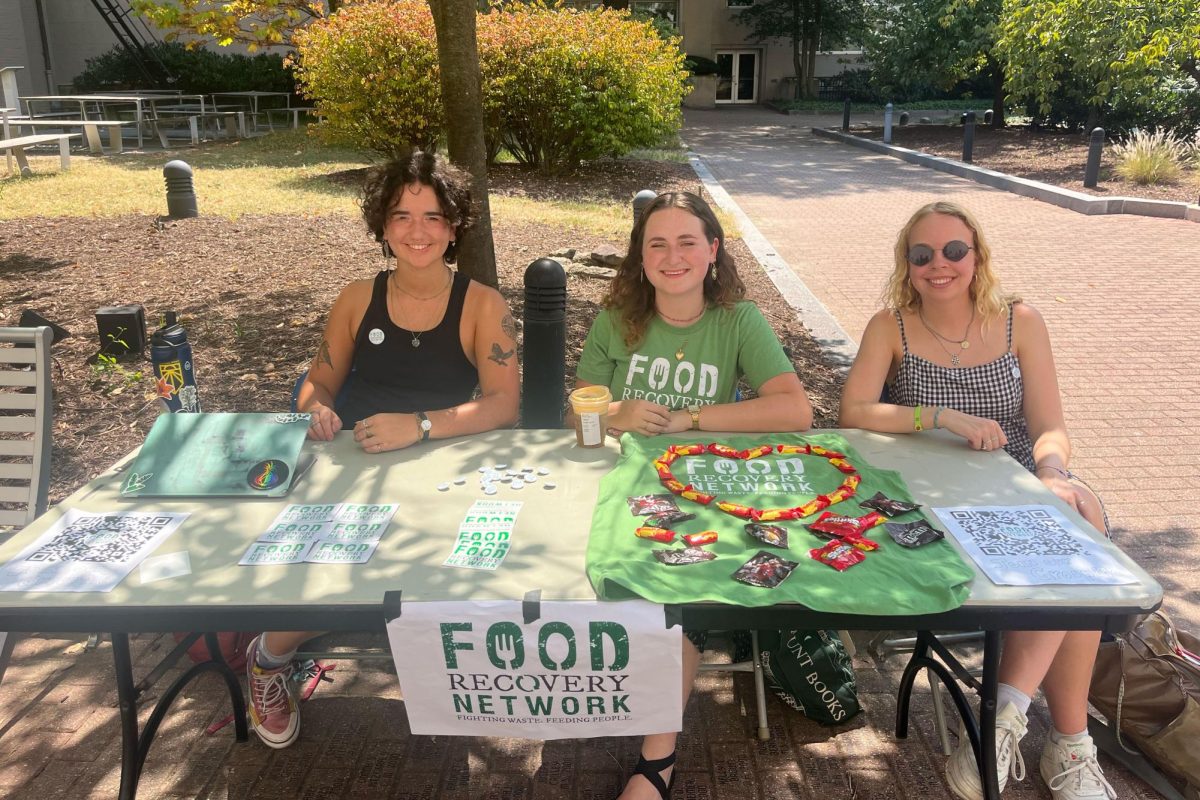A student organization is returning to campus with plans to eliminate food waste at GW.
GW Food Recovery Network members said they aim to reroute leftover food from catered campus events to homeless shelters and donation centers around the District, salvaging food that would have otherwise been thrown away. The group’s leaders said they noticed students disposing of edible food in compost bins after campus events rather than redistributing leftovers, which pushed them to revive GW FRN after its 2020 dissolution during the pandemic.
“We were just seeing how much edible food was getting put into composts, and I think all of us were kind of noticing that issue and like wondering about what to do,” said Rio Daims, a senior and the president of the GW FRN. “That was something that had been a structure in place at GW in years prior, so it seemed like a natural approach to fix the issue.”
Members said the primary food donation centers for GW FRN include The Store, GW’s food pantry in District House, Central Union Mission and Bread for the City, where the centers confirm the food is safe to donate and then distribute to unhoused people in D.C.
Daims said the organization, a chapter of the FRN’s national organization, hopes to reduce the amount of edible food placed in landfills or compost bins after events on campus. They said they expect to carry out two food recoveries per week, which involve attending catered GW events and collecting leftover food after the event, which members immediately drive to one of the donation centers.
“Many, many people kind of overestimate the amount of food that’s required for events or just eating in normal, every day meals,” Daims said. “We want to stop that in its tracks and also feed people in the process.”
Colin O’Brien, an associate for the Office of Sustainability and the staff adviser for GW FRN, said the network was completely student run prior to the pandemic but will now run through the Office of Sustainability. He said the network will be student run again in the future — with about 70 people already showing interest in the club — but he is currently “invested” because his focus at the Office of Sustainability is reducing food waste on campus, which inspired him to restart the network with student interns.
“We can really expand on the program and by having some support through the Office of Sustainability, it will be helpful in the longevity of the club itself because, obviously, students turn over and graduate and move on to different things,” O’Brien said. “So I can kind of be a resource for future leaders of the organization.”
O’Brien said GW FRN uses a “straightforward” model that uses volunteers, campus events and off-campus donation centers, which mirrors how it operated pre-pandemic, but they are also interested in recovering the edible leftovers at GW’s dining halls because many FRN chapters at other universities are “actively” involved in collecting leftover food produced through their own dining programs. He said the network will also explore opportunities to redistribute food on campus for GW students and staff who may be facing food insecurity.
”I hope that this becomes just a standard part of campus culture that when folks are planning events of any size, they’re reaching out to Food Recovery Network to coordinate a pickup of any leftovers and that just becomes a normal thing,” O’Brien said.
O’Brien said GW FRN will also provide food safety training at general body meetings for their members, which he said would come off as “trustworthy” to donation partners by affirming that student volunteers know how to handle food. Daims said after completing the training, volunteers would wear gloves and personal protective equipment to recover the leftover food at an event and then transport it to the respective donation center.
GW FRN Vice President Ella Marsh and Daims were both working as interns for the Office of Sustainability this spring when O’Brien posed the question of rejuvenating the organization. Marsh said students have been “receptive” to the organization by attending their tabling events and interacting with the former Instagram account, but many of the students already like to compost or work in GW’s GroW Garden.
Marsh said the recoveries they plan are “dependent” on the events other student organizations hold on campus, which determine whether they can collect and donate leftover food. She said scheduling volunteers may be difficult because there are no set shifts yet, but they will try to get the message out early so members can schedule the events around their classes and other commitments.
“If we show up to an event and they say there’s gonna be a bunch of extra food and there’s nothing, then it’s hard to communicate that,” Marsh said.
Senior Kristen Caldwell, a compost educator with the Office of Sustainability, said she heard talk about the network’s resurgence at work, which pushed her to help Daims and Marsh restart the club. As a compost educator, Calwell said she runs compost collections to increase sustainability efforts on campus, but repurposing food through GW FRN for those facing food insecurity presents an even more sustainable approach.
“If there’s a bunch of extra food, being able to compost it is a really great sustainability step,” Caldwell said. “But it would be more sustainable to have the food be eaten rather than composted.”





